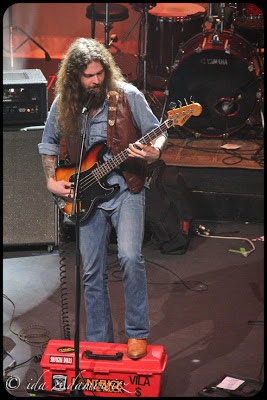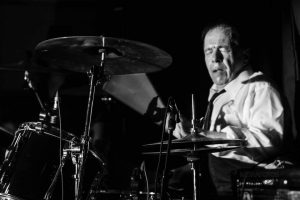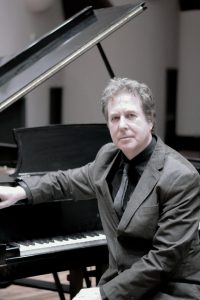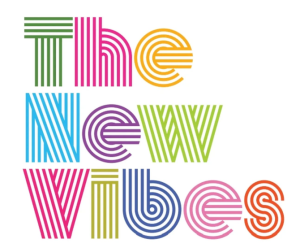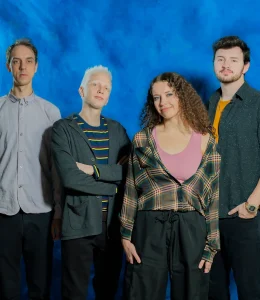 |
| Harvey at the Hamilton Music Awards, 2011 Photo by Ida Adamowicz |
By: Rachel Harvey
One of the challenges with interviewing someone you know, particularly if you’ve grown up with them, is that it’s hard to keep a straight face. Sounds unprofessional, but there it is. Rather than fight it, I decided to just go with the flow. I brought some sushi and beer along to interview my brother, Jon Harvey of Monster Truck, in the hopes that I could get him to say something scandalous.
The funny thing about my brother is that he’s quite an enigma: he’s egotistical and self-effacing all at once. I joked that I’d be calling the article “The Man Behind the Rock Star.” His response: “Man behind the rock star? Let’s not have that in there. I haven’t done shit.” This coming from the guy who went on and on about the great things he’s got in the works just a few minutes earlier. I felt led to ask if a musician is like an actor that puts on a different persona in the spotlight.
“Ya. Everyone I think does. You have to put on a great show, because if you don’t what’s the point? People are always surprised how timid I am when I get offstage. I put my glasses back on and I’m puttering around and everyone’s like ‘Hey man, you’re so crazy on stage and now you’re like a different person.’ I dunno, that’s how it is, I’m not crazy. Ooops.”
Ha. I choked briefly on a piece of California roll. Perhaps duality was a necessary evil in the world of rock. Or in the world of anything. I decided to bring up some of his recent accomplishments, like winning the Hamilton Music Award for Best Male Vocalist and Monster Truck’s Best Rock Recording award.
“Exciting. Winning Best Male Vocalist was really odd. I don’t think I’m the best singer in Hamilton at all, but whatever. It definitely builds up way more before it happens. I gave it [the award] to dad after.”
Wait a minute (I almost choked again). You don’t care about recognition?
“Recognition’s fine, but how many awesome artists in the world get the recognition they deserve? You know, if you look at a lot of the bands that win Grammys or whatever, they have good sales, and they’ve been selling things for years. So it’s less about art now, more about marketing.”
Hmmm. If being a successful musician was more about marketing now, had something been lost? What made an artist an artist then?
“Everybody’s an artist now. Everybody has that little piece of creativity they want to latch onto. It wasn’t always like this, not everybody wanted to do all these things, but people now instead of being creative in a tangible way, they’re planning parties. Creativity flowing in different facets. Everybody’s an artist now whether they like it or not. There’s no way to escape it.”
Deep. And speaking of depth, what about the latest announcement that Monster Truckis opening four shows in Ontario for the legendary Deep Purple?
“It’s pretty awesome, I mean, they’re one of my favourite bands of all time. So to get to open for them, I don’t know if it’s really sunk in yet. I’d be lying if I said I wasn’t nervous.”
No kidding. I wondered if there were any tried and true methods musicians had for dealing with nerves.
“I just, I dunno, ignore them. I drink two or three beers before going on stage. But you drink two beers before you play for 2,000 people and you’re still scared. And it’s not even about being scared because everyone there is on your side; they’re not saying ‘I want this guy to screw up so bad.’ Even when I think we suck people tell us we were awesome so you just take it.”
So fans seemed to be a huge support system. What about the Hamilton music scene? Was there a supportive community to be found there?
 |
| Jon Harvey |
“My experience of the Hamilton music scene is that it’s a very interesting place. Some people totally support you, others, well, I’ve heard people say, ‘When is Harvey gonna stop making pop music?’ Sorry, I don’t want to play unlistenable metal all the time. People have this preconceived notion that if you started doing something you should keep doing it.”
Funny, I thought the cultural myth of “selling out” had died along with the coolness of patch-covered backpacks. Apparently there were still some adherents. What about the Hamilton sound, was there a distinct flavour of music coming out of the city?
“It’s mostly heavy, gritty tunes. Even the country or other genres have this gritty honesty. I think Hamilton bands have so much honesty on a whole, it’s like a ‘Really, you like it?’ sentiment.”
So that self-effacing attitude was also a local condition. Interesting. After telling me his favourite venue in Hamilton is This Ain’t Hollywood, because it’s a rock-friendly bar with friendly people, he went on to mention that bands need to support each other, even if they dislike their music.
“Every Canadian musician who becomes successful helps other Canadian bands. There are bands in Canada that I don’t like, but because they’re putting things forward and paving the way for other bands to be successful, how can you hate them? It’s not exactly the biggest country in the world…oh wait, it is. But not the most popular, you know what I mean?”
Sure, made sense. As a writer, I wanted to move on and talk about Monster Truck’s song-writing process. Jon likened it to a Lennon/McCartney duo, where everything he sang was written by him and everything guitar player Jeremy Widerman sang was written by Jer. But I had an objection—I was not a fan of the representations of women in MT’s songs. For example, the song Huge and Awesome focused on a girl’s breasts, and Love Attack talked about a woman being conquered by “love.” So I asked Jon what he had to say for himself. Did the genre make him do it?
“Ahaha, no, I was just being a ridiculous arrogant idiot. Seriously, most of those songs like Love Attack and Huge and Awesome, I had no idea we were going to be recording these or shooting videos for these. So basically now I find myself trying to backpedal out of these lyrics. The worst part is we as a band have so much respect for women but this sex stereotype, it works so well to just sell sex all the time. See, Love Attack is a bad example because that was written like two years ago, but now if I was gonna say something like that I’d try to approach it like Wilson Pickett approached it, you know, 99 and a half just won’t do, it’s gotta be 100%, you got to give me your lovin’. He’s saying the same things I’m saying, but tactfully, and I like that aspect of it way more now than just spelling it out.”
I wondered what Jon would say to the idea that a musician is a role model.
“I think putting a musician as a role model is completely crazy. That’s like saying Bob Dylan’s a role model or Jimi Hendrix is a role model. Especially rock n’ roll musicians, good luck. Any celebrity as a role model is a bad idea. I’ve met so many people who live life in the entertainment industry and are never sober.”
Could it be that it’s harder to be a musician today, than it was, say, 10 years ago?
“Well, there’s no money in it anymore. The only way artists or bands make money is shows.”
If live shows were the money-makers, it stood to reason that a band manager would be important.
“I think management’s pretty important and we have yet to see how really important it is. We’re playing the 102.1 shows and Deep Purplebecause of him [Nathan Stein]. Management’s pretty much the middle man between the world and the band. I can guarantee we would not be anywhere close to where we are right now without it, only because they know the people and get us the opportunities.”

I asked Jon what advice he would give to budding musicians, and he said to simply keep going, that it was never too late to learn an instrument or join a band. “If you want it, go for it, why not?”
Easier said than done for some, perhaps. What about equipment, what was his favourite guitar to play?
“I just got my favourite bass. It’s a 1979 Ibanez Blazer. So many people have said it’s a piece of crap but I love it so much. I love crappy basses, I don’t know what it is, Japanese-made early to late 70s basses are my favourite. They just have this character to them, they always play good, they’re always the kind of bass that’s been played into the ground and been put in someone’s closet for like 10 years and when you get it it’s still mint and still good.”
Rock on. So where was Monster Truck headed next? They had a much-awaited LP that they were itching to get into the studio and record, and as soon as the red tape (aka budgetary issues) got cleared up, they’d be rocking. As far as Jon’s vision for the band: “This ain’t rocket science. We’re not trying to change the world, we’re just trying to have a good time and help other people have a good time. The vision is just to make better music. No crap, no philosophy, no religion, just good tunes that people can hang out to.”
For the final words, I asked Jon to complete this sentence: Without my leather vest, I would _______.
“Look like everybody else.”
——————————

Rachel Harvey is in her last semester (!) at McMaster University, studying English and Cultural Studies. She writes weekly reviews for TVGuide.ca, and loves composing poetry and creative non-fiction in her “spare” time. She’s also a closet country singer/songwriter, and hopes to recruit Jon for her band “Rachel Strong and the Sentimental Hearts.”

